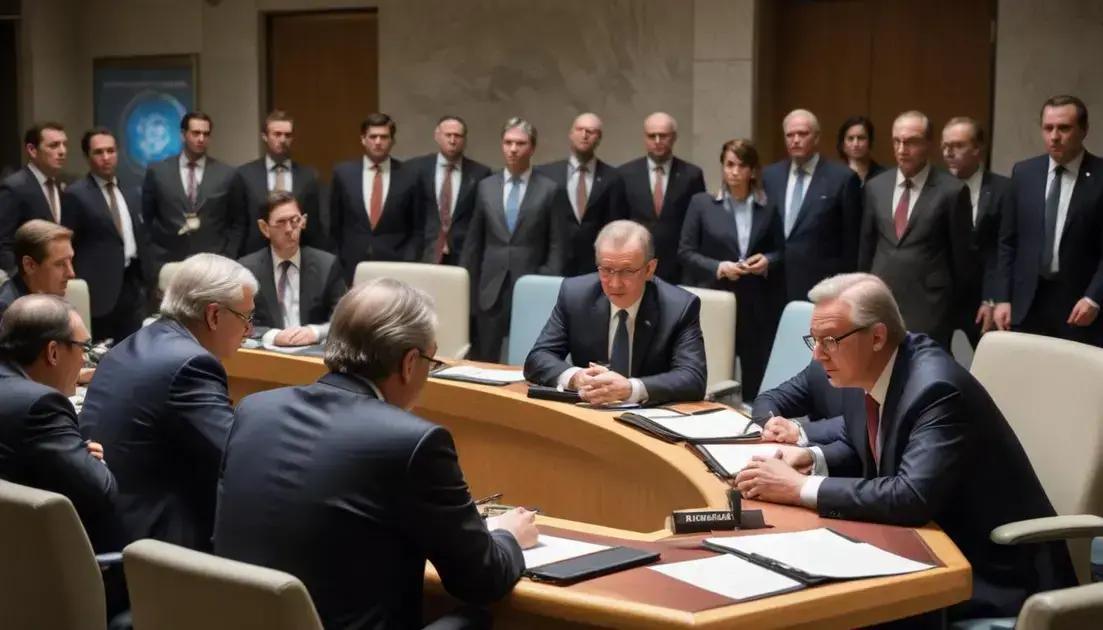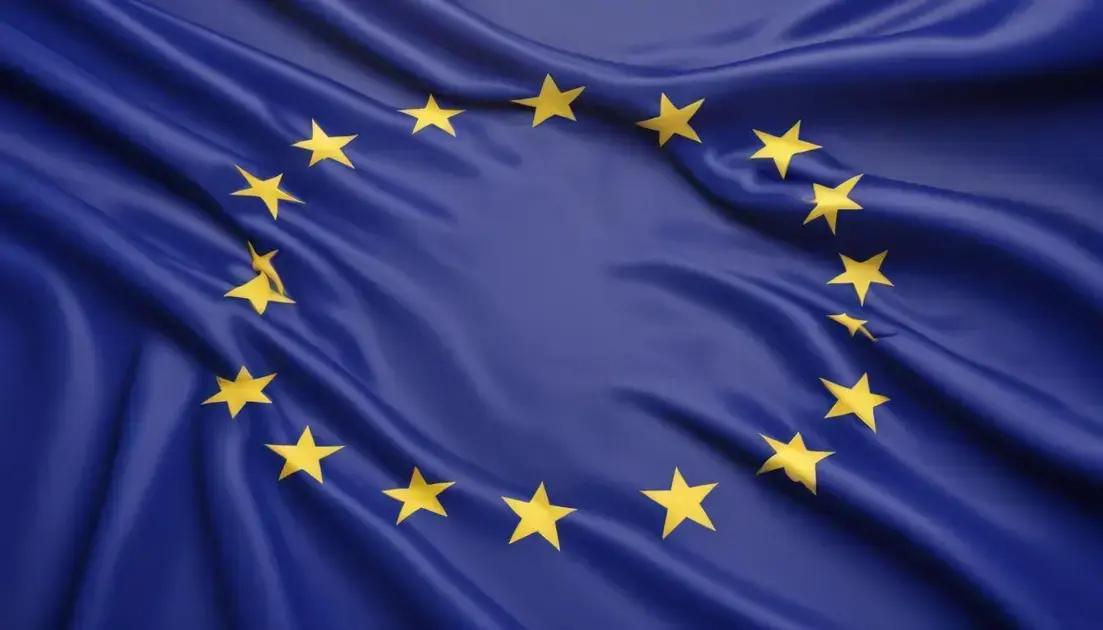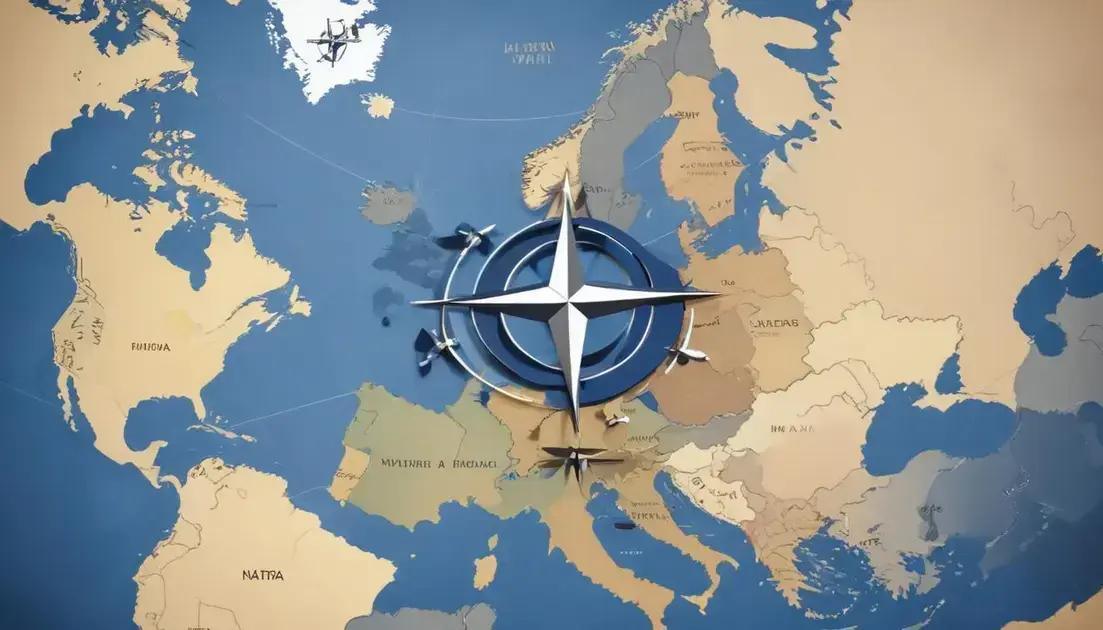
Diplomacy and Espionage: UN as Secret Stage
The future of diplomacy and espionage is shaped by advancements in technology and changing global dynamics. As nations face threats such as cyber espionage, they must adapt their strategies for communication and information gathering. Cooperation is essential for addressing international challenges effectively. By utilizing both traditional and modern methods, diplomats can foster relationships while promoting peace and security worldwide.
Have you ever thought about the hidden layers of diplomacy? Often, what seems like a straightforward negotiation could be a clever disguise for something much more intricate. In this piece, we delve deep into the world where diplomacy meets espionage, exploring the undercurrents that shape global affairs.
The dual role of diplomacy
Diplomacy plays a dual role in our world today. On one side, it’s about peaceful negotiations between nations. On the other, it often involves secretive actions that can include spying. These two roles might seem opposite, but they often work hand in hand.
The Open Facade of Diplomacy
Diplomats are trained to communicate and build relationships. They work hard to resolve conflicts and create agreements. Their goal is to maintain peace and cooperation among countries. This public side of diplomacy is vital for global stability.
The Hidden Side: Espionage
However, not all actions are visible. Behind closed doors, diplomats may gather vital intelligence. This can involve monitoring other nations’ moves or understanding political climates. Such actions are essential, even if they’re not openly discussed.
These secretive operations can provide crucial information that shapes policies. They allow countries to anticipate threats and respond appropriately. In this sense, espionage becomes a tool that complements diplomatic efforts.
Balancing Both Roles
The challenge lies in balancing these dual aspects. Countries must be careful not to betray trust while gathering intelligence. Missteps can lead to misunderstandings and conflicts. Finding a middle ground is important for effective diplomacy.
As diplomatic landscapes change, the importance of understanding this dual role grows. Keeping peace while staying informed is an ongoing challenge for nations around the globe.
Espionage tactics within diplomatic missions
Espionage tactics are often hidden within diplomatic missions. These tactics can help countries gather important information without raising suspicion. Diplomats might seem friendly, but they can also be sharp-eyed observers.
Common Espionage Methods
One common method is to use technology for data collection. Devices can record conversations or gather information about meetings. This can happen right under the noses of unsuspecting colleagues.
Human Intelligence Gathering
Another tactic involves human intelligence. Diplomats can build relationships and gather info through informal chats. These conversations can reveal a lot about a country’s plans and intentions.
They also attend social events to connect with influential people. These social interactions can unlock valuable insights for their government.
Using Cover and Disguises
Some diplomats might use cover identities to blend in. This makes it hard for others to spot their real agendas. By appearing as regular citizens, they can gather intel without attracting attention.
These tactics aren’t just sneaky; they’re often necessary to stay informed. Knowledge from these operations can shape important decisions in international relations.
Case studies of uncover operations
Case studies of uncover operations show how espionage works in real life. These situations offer insights into diplomatic tactics. Many nations rely on these strategies to protect their interests.
Operation Mincemeat
One famous example is Operation Mincemeat during World War II. British intelligence created a fake identity to mislead the Nazis. They placed false documents on a corpse in the ocean.
This clever plan was successful. It diverted enemy attention, leading to a critical victory for the Allies.
The Cambridge Five
The Cambridge Five is another notable case. This group of British spies worked for the Soviet Union during the Cold War. They gathered valuable intelligence and influenced major political events.
Their actions showed how deep undercover work can change the course of history.
Recent Developments
More recently, nations have used technology for uncover operations. Cyber espionage has become a common tactic. Hackers infiltrate systems to steal sensitive information without physical presence.
These case studies highlight the importance of understanding espionage. Nations adapt their strategies based on past successes to stay ahead in today’s landscape.
Impact of UN’s history on global politics
The impact of the UN’s history on global politics is significant. Since its founding in 1945, the UN has played a key role in shaping international relations.
Promoting Peace and Security
One of the main goals of the UN is to promote peace. It helps prevent conflicts through diplomacy. By facilitating dialogues, the UN offers nations a platform to resolve issues peacefully.
Human Rights Advocacy
Another important aspect is human rights. The UN sets international standards to protect rights across the globe. Its declarations and treaties promote equality and justice, influencing lawmakers in many countries.
Addressing Global Challenges
The UN also tackles global challenges like poverty and climate change. Through agencies like UNICEF and WHO, it pushes for solutions to issues affecting many lives. This makes the UN crucial in the fight against inequality.
Moreover, its efforts in humanitarian aid help millions during crises. These initiatives showcase the UN’s commitment to improve lives worldwide.
Influencing International Law
Additionally, the UN has influenced international law. Many treaties and agreements emerge from UN discussions. These laws help regulate state behavior and establish norms for nations.
Overall, the historical role of the UN continues to shape global politics today. Its influence can be seen in how countries interact, cooperate, and address shared challenges.
The future of diplomacy and espionage
The future of diplomacy and espionage is evolving rapidly. As the world changes, so do the methods used by nations. Technology plays a huge role in this transformation.
Technological Advancements
New technologies impact how diplomats work. Communication tools have improved how information is shared. Real-time data allows for quicker decision-making. This can enhance diplomatic efforts.
Emerging Threats
Espionage tactics are also advancing. Cyber espionage is a growing concern. Hackers can steal sensitive data without being physically present. This makes protecting information more difficult.
Global Cooperation
Countries may need to work together more than ever. Global challenges like climate change require collaboration. Diplomats must navigate these complex issues to find solutions.
In this climate, soft power becomes crucial. Nations can use culture and diplomacy to build relationships. This approach helps in creating partnerships that benefit everyone.
Changing Political Landscapes
As political dynamics shift, traditional methods may become outdated. Diplomats will need to adapt their strategies to meet new demands. Understanding public opinion and social media will be key.
In summary, the future of diplomacy and espionage will be shaped by technology, cooperation, and adaptation. Nations must stay ahead to promote peace and security in a changing world.
Conclusion
In conclusion, the future of diplomacy and espionage relies heavily on adapting to new challenges. Technology will play a big role in how nations communicate and gather information. As countries face emerging threats like cyber espionage, cooperation among them becomes essential.
By using both traditional and modern methods, diplomats can better navigate complex international issues. Building relationships through soft power and cultural exchange will help nations work together more effectively.
Overall, staying ahead in the fields of diplomacy and espionage is crucial for maintaining peace and security. The ability to adapt to change will determine how successful nations are in the future.


